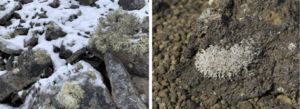Desde el momento en que quedan expuestas, las rocas de cualquier ambiente son colonizadas por microorganismos y líquenes con capacidad de interaccionar y transformar el sustrato mineral que habitan. “La actividad de los microorganismos, que colonizan secuencialmente la roca, genera en ellas transformaciones físicas y químicas, en un proceso conocido como biometeorización, que podemos caracterizar por microscopía y técnicas microanalíticas”, expone la investigadora del MNCN Asunción de los Ríos. “A través de estas investigaciones podremos conocer como los habitantes microbianos de las rocas contribuyen tanto al funcionamiento de los ecosistemas antárticos, como a su resiliencia frente al cambio climático”, continúa.
“Queremos caracterizar las comunidades microbianas polares y su capacidad para meteorizar rocas. Vamos a estudiar sus dinámicas de colonización en lavas volcánicas de diferentes erupciones en la Isla Decepción y rocas de morrenas glaciares en la Isla Livingston, ambas en el archipiélago antártico de Shetland del Sur. Además, gracias a nuestras investigaciones previas en Islandia, podremos comparar estos procesos en ambas regiones polares”, comenta el investigador del MNCN, Fernando Garrido.
Un aspecto especialmente innovador de la expedición es que, gracias a los desarrollos ya obtenidos en el proyecto TRAITS, se usará un laboratorio portátil capaz de funcionar de forma autónoma unido a un novedoso sistema informático, que nos permitirá secuenciar y analizar ADN microbiano directamente en el punto de muestreo. “Tener datos de los genomas microbianos en unas pocas horas en lugar de esperar al regreso para analizar las muestras, nos permite diseñar el curso de la campaña de acuerdo a los resultados que vayamos obteniendo”, apunta el investigador del CNB Javier Tamames.
“Las características de esta investigación, tanto por su carácter innovador, como por la ubicación e interés de los sistemas a estudiar, estamos seguros de que proporcionaran resultados novedosos y de gran relevancia para entender el funcionamiento del ecosistema antártico y contribuir a su conservación”, termina de los Ríos.
La expedición, que forma parte de la XXXV Campaña Antártica Española, está financiada por el Ministerio de Ciencia e Innovación y coordinada a través del comité polar. Los proyectos implicados en la investigación (ROCK-EATERS, PID2019-105469RB-C22 y TRAITS ,PID2019-110011RB-C3) están financiados por la Agencia Estatal de Investigación.






